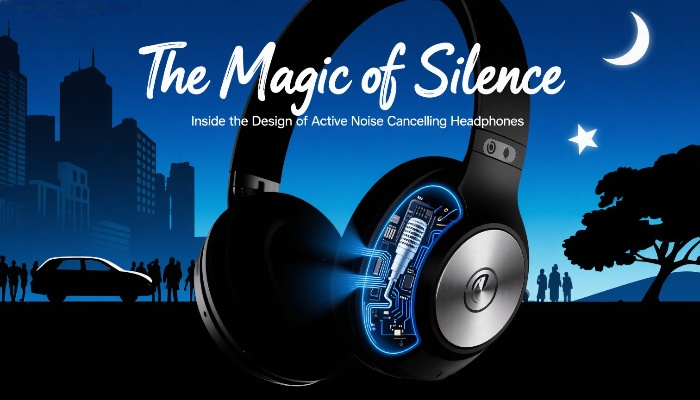- Missed It? Get a Second Chance. Black Friday Reloaded.
HK$0.00
The Magic of Silence: Inside the Design of Active Noise Cancelling Headphones
1. Anatomy of ANC Headphones: A Look Inside
At the heart of every ANC headphone lies a sophisticated interplay of microphones, processors, and speakers. The core components include:
- Feedforward Microphones: Positioned on the outside of the ear cup, these mics detect ambient noise before it reaches your ear.
- Feedback Microphones: Located inside the ear cup, close to your ear, these mics monitor the sound that actually reaches the listener1.
- Hybrid Systems: Many modern headphones combine both microphone types for improved performance across a wider frequency range1.
2. Microphone Layout: Feedforward vs. Feedback
| Microphone Type | Location | Strengths | Limitations |
|---|---|---|---|
| Feedforward | Outside ear cup | Excellent at catching external noise early | Can be affected by wind and fit |
| Feedback | Inside ear cup | Monitors actual sound reaching the ear | May struggle with sudden loud noises |
| Hybrid | Both in & out | Best of both worlds, wider frequency range | More complex and costly |
- Feedforward Microphones capture noise before it enters the ear cup, allowing the system to react quickly, especially to higher-frequency sounds.
- Feedback Microphones listen to what the listener hears, enabling precise correction, particularly for lower frequencies and any noise that slips past passive isolation.
- Hybrid Designs leverage both, resulting in deeper and more consistent noise cancellation across various environments1.
3. The Noise Cancelling Algorithm: How Silence is Engineered
The magic of ANC lies in its use of destructive interference. Here’s how it works:
- Noise Detection: Microphones pick up ambient sounds.
- Signal Processing: The ANC chipset analyzes the noise in real time, calculating its frequency and phase2.
- Anti-Noise Generation: The system creates a sound wave with the same amplitude but inverted phase (180° out of phase) to the detected noise.
- Sound Wave Cancellation: When the anti-noise wave meets the original noise, they cancel each other out, leaving only the intended audio2.
“The ambition is to create perfect cancellation inside the ear. The FF [feedforward] system uses a microphone, digital signal processing (DSP), and the transfer function of the speaker generating sound in the ear canal… The idea is to pick the ANC filters to achieve complete cancellation so that active and passive signals are equal in magnitude and perfectly out of phase at every frequency.”2
Precision in Design: Achieving effective cancellation requires meticulous matching of phase and amplitude. Even slight mismatches can reduce the effectiveness, so ANC algorithms are finely tuned to adapt to changes in noise and headphone fit in real time2.
4. Brand Comparisons: Depth, Frequency Range, and Ingenious Design
Different brands approach ANC with unique design philosophies and technical strengths:
| Brand | Microphone Layout | Noise Cancelling Depth | Frequency Range Targeted | Signature Features |
|---|---|---|---|---|
| Sony WH-1000XM6 | Hybrid (12 mics) | Exceptional | Wide (bass to treble) | Adaptive ANC, custom EQ, foldable design |
| Bose QC Ultra | Hybrid | Outstanding | Focus on low/mid freq | Comfort, deep cancellation, clear calls |
| Bowers & Wilkins | Hybrid (8 mics) | Top-tier | Broad, balanced | Rich sound, sleek build, app controls |
| Apple AirPods Max | Hybrid | Very good | Adaptive across range | Seamless iOS integration, spatial audio |
- Sony: Known for deep, adaptive ANC that excels across a broad frequency spectrum, thanks to multiple microphones and advanced processors.
- Bose: Renowned for comfort and powerful low-frequency cancellation, making them a favorite for travelers.
- Bowers & Wilkins: Focuses on a rich soundstage with strong ANC, balancing noise reduction and audio fidelity.
- Apple: Offers seamless integration and adaptive ANC, with a focus on user experience.
5. Ingenious Design: The Art and Science of Silence
What sets leading ANC headphones apart is not just the hardware, but the clever integration of microphones, real-time digital signal processing, and ergonomic design. Key innovations include:
- Multi-microphone arrays for spatial noise detection3.
- Adaptive algorithms that adjust to changing noise environments and headphone positioning24.
- Custom-tuned drivers and acoustic chambers to maximize both passive and active noise reduction1.
These design choices reflect a blend of acoustic engineering, digital signal processing, and user-centric thinking—turning everyday headphones into high-tech sanctuaries.
Visualizing the Technology
Below is a typical layout of microphones in modern hybrid ANC headphones:
- Feedforward mic: Outside the ear cup, facing the environment.
- Feedback mic: Inside the ear cup, near the speaker and ear.
- Speaker: Generates both the intended audio and the anti-noise signal.
- ANC Chipset: The brain that processes signals in real time.
Active noise cancelling headphones are a triumph of modern engineering, combining precise hardware placement, intelligent algorithms, and clever design to bring peace to a noisy world. As brands continue to innovate, the future of silence looks brighter—and quieter—than ever.
- http://owolff.com/en/application-support/active-noise-cancellation/
- https://audioxpress.com/article/development-design-the-impact-of-microphone-specifications-on-active-noise-cancellation-performance
- https://pub.dega-akustik.de/DAGA_2022/data/articles/000252.pdf
- https://www.hsu-hh.de/ant/wp-content/uploads/sites/699/2019/04/INNO19_Rivera_et_al_v1.pdf

XIMAND Blog
Here, we dive into the ever-evolving world of electronics—from smartphones and laptops to smart home gadgets, wearables, and cutting-edge AI innovations. Whether you’re looking for in-depth reviews, practical tips, or insights into industry trends, you’ll find valuable content tailored for you.
Technology isn’t just changing the way we live—it’s reshaping the future. Whether you’re a tech enthusiast, a casual user, or simply searching for the perfect gadget, this blog offers expert, unbiased, and easy-to-understand guidance.
.

Product categories
Posts Widget
Join our newsletter
Get our emails for info on new items, sales and much more.
Register now to get latest updates on promotions & coupons. Don’t worry, we not spam!
Your Phone’s Ultimate Case.
Join thousands who trust Ximand for daily durability without sacrificing style.
Need Help?
Customer Service
- -5% for all order in this week
- Free delivery for all orders






